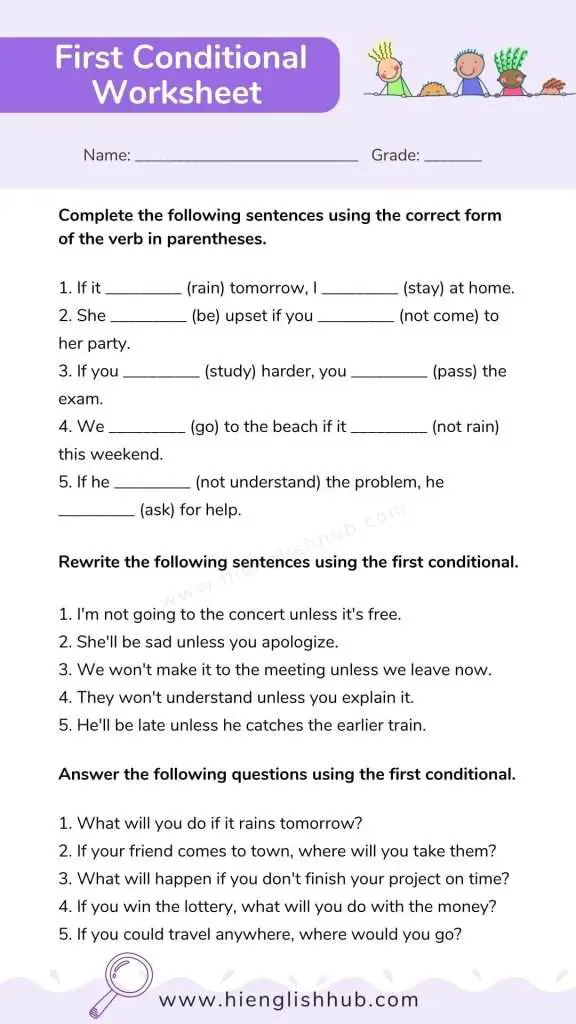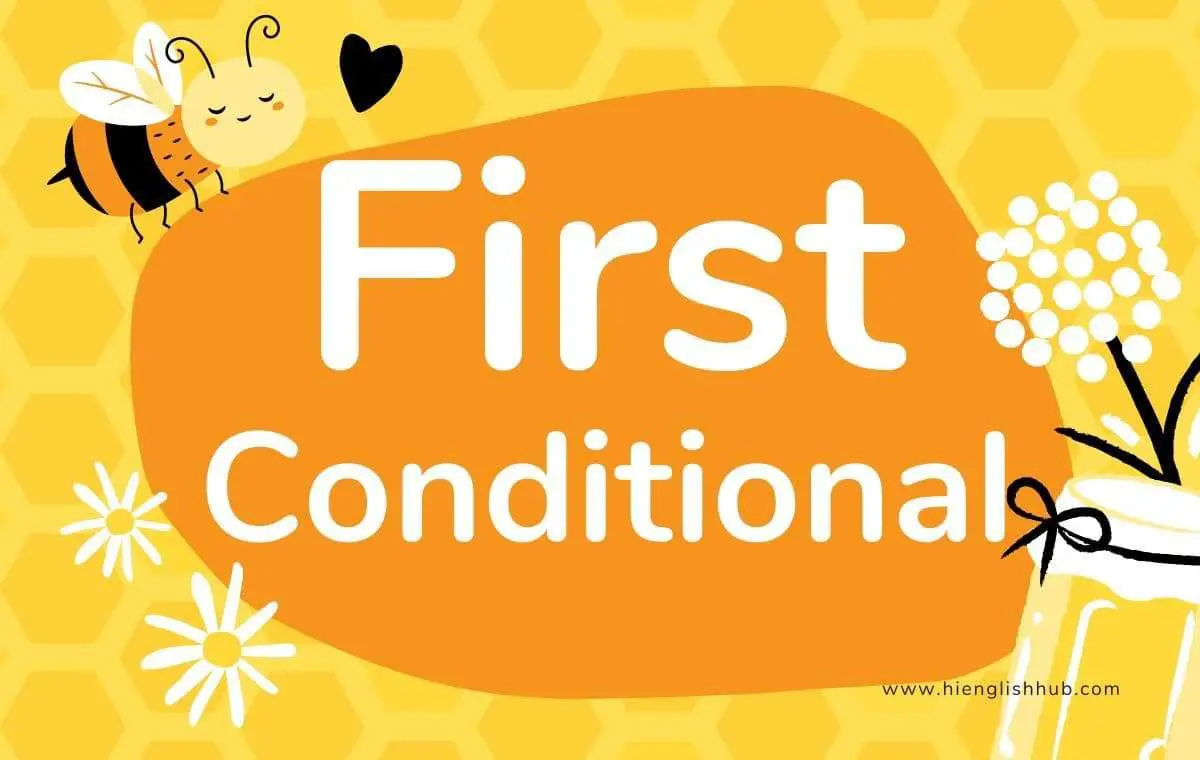Welcome aboard! Are you ready to dive into the fascinating world of the first conditional?
In this blog post, we’ll embark on a journey to explore the ins and outs of this powerful grammatical structure.
From understanding its form to discovering its real-life applications, we’ve got you covered.
But wait, there’s more! We’ve prepared a special treat for you—free exercises to put your newfound knowledge into practice.
So buckle up and get ready to unlock the magic of the first conditional!
Read on:
What Is The First Conditional?
The first conditional, also known as the “real conditional,” “possible condition,” or “likely future,” is a structure used in English grammar to talk about probable or possible events in the future.
These are future situations that are seen as likely or real by the speaker.
First Conditional Structure
The first conditional consists of two clauses, one with “if” and one main clause.
The structure is as follows:
| First Conditional | Structure | Example |
|---|---|---|
| Affirmative Form | If + present simple, will + base form of verb | If we play truth or dare, I will prepare the questions. |
| Negative Form | If + present simple, will + not + base form of verb | If we don’t play truth or dare, I won’t need to think of any questions. |
In these examples, the “if” clause expresses a condition, i.e., something that must happen first for the other thing to happen. The other clause then expresses a possible result of this condition.
Keep in mind that the order of the clauses does not change the meaning. You could just as easily say, “I will prepare the questions if we play truth or dare.”
When To Use The First Conditional In English
The first conditional in English is used to talk about real and possible situations which might happen in the future.
The first conditional discusses conditions and possible results which are likely or probable, not certain or unlikely. For uncertain or unlikely conditions, we typically use the second or third conditionals.
Here are some scenarios where you might use the first conditional:
| Use Case | Example | Explanation |
|---|---|---|
| Predictions | If it continues to rain, the game will be canceled. | Used when you believe something is likely to happen in the future. |
| Plans | If I pass the IELTS speaking exam, I will celebrate. | Used when discussing plans contingent on certain conditions. |
| Warnings | If you don’t slow down, you will get a speeding ticket. | Used to warn someone that if certain conditions are met, something else will likely happen. |
| Advice | If you feel sick, you should go to the doctor. | Used when giving advice about future actions. |
| Conditional Offers or Promises | If you help me with the dishes, I will help you with your homework. | Used when making an offer or promise that depends on a condition being met. |
10 First Conditional Sentences
Here are 10 sentences using the first conditional:
- If it rains tomorrow, we will stay indoors.
- If you study hard, you will pass the exam.
- If she finishes her work early, she will join us for dinner.
- If they offer me the job, I will accept it.
- If he doesn’t apologize, she will be upset.
- If I save enough money, I will buy a new car.
- If he forgets to set his alarm, he will be late for work.
- If I see her, I will say hello.
- If we miss the bus, we will have to walk.
- If you eat too much candy, you will get a toothache.
Asking Questions Using the First Conditional
The first conditional can also be used to ask questions. Here, you will still have an ‘if’ clause and a main clause. However, in the main clause, the ‘will’ and subject are switched in order to form a question. Here are some examples:
- If it rains, will you stay at home?
- If you finish your work early, will you go to the cinema?
- If I make dinner, will you wash the dishes?
Common Mistakes to Avoid When Using the First Conditional
| Common Mistake | Incorrect Example | Correct Example | Explanation |
|---|---|---|---|
| Incorrect tense in the ‘if’ clause | If it will rain, I will stay at home. | If it rains, I will stay at home. | The ‘if’ clause should always use the present simple tense, not the future tense. |
| Incorrect word order in questions | If you see her, you will tell her? | If you see her, will you tell her? | For questions, the structure should be “Will + subject + base form of the verb.” |
| Forgetting the comma when the ‘if’ clause comes first | If it rains we will stay inside. | If it rains, we will stay inside. | A comma should be used to separate the ‘if’ clause and the main clause when the ‘if’ clause comes before the main clause. |
First Conditional Worksheet

Complete the following sentences using the correct form of the verb in parentheses.
- If it _________ (rain) tomorrow, I _________ (stay) at home.
- She _________ (be) upset if you _________ (not come) to her party.
- If you _________ (study) harder, you _________ (pass) the exam.
- We _________ (go) to the beach if it _________ (not rain) this weekend.
- If he _________ (not understand) the problem, he _________ (ask) for help.
Answers:
- If it rains tomorrow, I will stay at home.
- She will be upset if you do not come to her party.
- If you study harder, you will pass the exam.
- We will go to the beach if it does not rain this weekend.
- If he does not understand the problem, he will ask for help.
Rewrite the following sentences using the first conditional.
- I’m not going to the concert unless it’s free.
- She’ll be sad unless you apologize.
- We won’t make it to the meeting unless we leave now.
- They won’t understand unless you explain it.
- He’ll be late unless he catches the earlier train.
Possible Answers:
- If the concert is free, I will go.
- She will be sad if you don’t apologize.
- If we leave now, we will make it to the meeting.
- If you explain it, they will understand.
- If he catches the earlier train, he won’t be late.
Answer the following questions using the first conditional.
- What will you do if it rains tomorrow?
- If your friend comes to town, where will you take them?
- What will happen if you don’t finish your project on time?
- If you win the lottery, what will you do with the money?
- If you could travel anywhere, where would you go?
Possible Answers:
- If it rains tomorrow, I will stay indoors.
- If my friend comes to town, I will take them to the local attractions.
- If I don’t finish my project on time, there will be consequences.
- If I win the lottery, I will invest some of the money and go on a vacation.
- If I could travel anywhere, I would go to Japan.
Final Thoughts
As we wrap up our exploration of the first conditional, we hope you’ve found this journey insightful and empowering.
Whether you’re making predictions, giving advice, or discussing likely outcomes, the first conditional empowers you to express future possibilities with finesse.
Now, it’s time to put your knowledge into practice. We encourage you to share your newfound expertise with friends, classmates, or fellow language enthusiasts.
Spread the word and help others discover the power of the first conditional. Remember, the more you use it, the more natural it will become in your conversations.
So go ahead, share this post, and let’s collectively embrace the potential of the first conditional.
Happy exploring, and keep up the great work!

